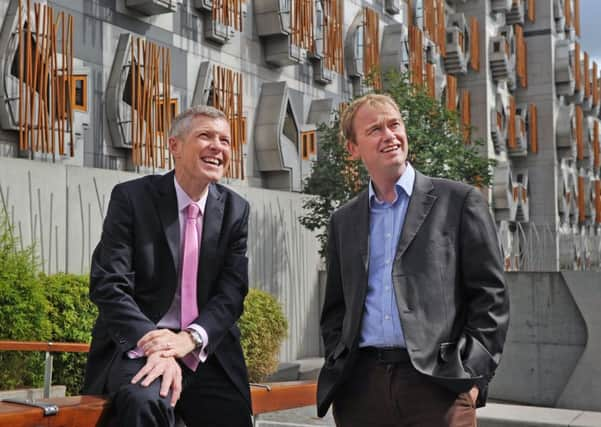Christine Jardine: New direction not just for Labour


Conference will be a bit different this autumn. In the Liberal Democrats, we’ve become used to discussing the business, and difficulties, of government in recent years.
But this weekend we will gather in Bournemouth with an entirely different agenda, and leader.
Advertisement
Hide AdAdvertisement
Hide AdThis year I doubt if there will be many arguments about the coalition. There seems little point now. It’s the past.
No. This year will be about the future, about rebuilding, about Tim Farron’s vision.
Because while the Labour Party has been convulsed by the implications of a return to conviction politics, the Liberal Democrats have quietly embraced the idea.
It’s brought an unexpected air of anticipation, even excitement, to conference planning.
That is not to say that the previous leadership was not driven by conviction, but rather that the prevailing media commentary tended to focus on its role in government rather than its aspirations for change.
And while their increase in membership seems to have caused the Labour Party no end of angst over who these new people might be, the Lib Dems’ additional numbers – now approaching 20,000 since May – is another unexpected positive.
There is, however, one other factor this year which is liable to fascinate the media and members in equal measure, and seems to epitomise the differing reactions to defeat in the two camps. Who are these Labour MPs texting Tim Farron, and what do they want?
Far from beckoning in the end of Liberalism in this country, there are many who now believe that the fall-out from the 2015 general election may in fact herald, if not a new dawn, then at least a real chance to rebuild.
Advertisement
Hide AdAdvertisement
Hide AdIronically that may be intrinsically linked with the fate of the Labour Party.
And the key is the election of the new party leaders.
In Farron, the Liberal Democrats have chosen a conviction politician who was not damaged by a coalition in which he was not a minister, voted against tuition fees and is cut from a very different cloth to what we have become used to seeing on the front benches.
A down to earth “northerner” who hails from Preston, went to university in Newcastle, and represents Westmoreland and Lonsdale, he is a complete break from the recent past.
In his first speech as leader he defined his brand of liberalism saying: “As the world changes around us, we see the opportunities and not just the dangers, because we see the best in people. We trust people. That’s why we stand up for the individual against the state. Why we stand up for the minority against the majority. Why we stand up for the outsider against the establishment. Because that is not just what we do, it is who we are.”
He was the first party leader to visit the refugees – in Calais – and he is committed to better housing and green energy.
But while his predecessor had to fight for every inch of the political ground he could grasp, the middle and centre left of British politics may just have opened up for Tim Farron to claim for his party’s own. It’s a development of which delegates gathering in Bournemouth are only too aware.
The election of Jeremy Corbyn has sent shock waves through Westminster.Not least because he seems to have tapped into a mood of dis-satisfaction with the old style of politics.
The old image of politicians.
The old “theatre” of the House of Commons.
That desire for something new, a different approach, for conviction rather than pragmatism in politics plays to Tim Farron’s strengths.
Advertisement
Hide AdAdvertisement
Hide AdBut while so called Corbynmania has also, according to reports, left many in the Labour Party at best confused, in some cases completely disillusioned over the direction they fear their party is about to take, it has only reinforced the spirit of revival in Lib Dems.
For many of us, it felt like the final piece had fallen into place to ensure that this summer we have turned away from the approach which, I believe, has done more to damage British politicians and our image with the public than any other.
For too long the tendency, particularly in Scotland, has been to define political parties in terms of what they are not: The SNP is not a Westminster, Unionist party. The others are not the SNP.
The strict adherence to what the polls told you voters wanted which began with Tony Blair, may be a thing of the past.
The hope amongst many arriving in Bournemouth will be that we are moving on, or perhaps returning to a political era they recognise as more naturally ‘liberal’ and radical. Many of them joined because of David Steel’s groundbreaking Abortion Act, or Shirley Williams’ courage in putting principle and what she believed was in the public interest before her own career.
Or perhaps, like me, it was the inspiration of Charles Kennedy standing up and saying clearly what so many of us felt about Iraq: “This war is illegal and I want no part of it.”
Just this week while sifting through old boxes in the loft I came across a newspaper from the immediate aftermath of the Jeremy Thorpe and Norman Scott fiasco. The future the commentary in it predicted for the then Liberals was not a sunny one. But the party not only survived, it began to prosper and was given fresh impetus by disillusionment in the Labour Party.
This summer, again, many wondered how dark this winter might be for the Liberal Democrats. But as the party moves on to the next stage of its history there is now a feeling among members that perhaps there is glimmer of light after all.